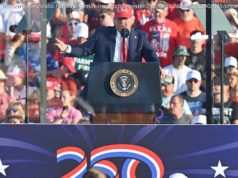His jurisprudence would render economic and environmental regulation nearly impossible.
There’s a reason that groups like the US Chamber of Commerce are still backing Brett Kavanaugh despite serious accusations that he sexually assaulted one or more women in his younger days, which Kavanaugh denies. Big business knows that Kavanaugh could be a boon to their bottom line.
One of the biggest questions facing the American judiciary is whether the Constitution allows elected representatives to meaningfully regulate the national economy.
Kavanaugh clearly believes it does not: He has called the existence of independent regulatory agencies — notably including the Consumer Financial Protection Bureau but potentially the entire alphabet soup of FCC, FTC, CFTC, SEC, FEC, etc. — a “threat to individual liberty.”
But rather than debate this squarely, we are instead faced with grifters like Kavanaugh’s former boss Ken Starr insisting in the pages of the Washington Post that Kavanaugh stands for nothing more than a simple “pro-democracy, let-the-people-govern-themselves vision.”
The truth is quite the opposite — Kavanaugh’s vision, which he shares with Starr and the bulk of the conservative legal academy, is one in which the courts should stand as staunch allies of capital and block any effort at democratic control of big business.
The notion that Kavanaugh holds a pro-democracy vision is what the Post put in Starr’s headline, but the full sentence makes it clear that the former special prosecutor is running a shell game. Starr’s claim is not that Kavanaugh believes in deference to the elected branches of government and will be reluctant to strike down laws as unconstitutional. Rather, what Starr argues (emphasis mine) is that Kavanaugh’s “pro-democracy, let-the-people-govern-themselves vision has been evident in his incisive questioning of the modern-day judicial emphasis on courthouse deference to administrative agencies.”
In short, Starr praises Kavanaugh for favoring judicial activism in pursuit of a light-touch regulatory agenda.
The way the American political system works is that passing laws is clunky and difficult. Between bicameralism, the presidential veto, the committee system, and the filibuster, it’s just very hard to get new legislation enacted. At the same time, the business world moves fast to try to exploit profit-making opportunities. So if you want to regulate business effectively, you can’t play legislative whack-a-mole and spot abuses in real time. What reformers do instead is try to create regulatory agencies that are given broad mandates to police areas of conduct.
A classic example is the Clean Air Act, which charges the Environmental Protection Agency with identifying forms of harmful air pollution and promulgating rules to cost-effectively reduce it, rather than counting on Congress to pass new laws every time science or business practice changes.
To make this system work, judges need to show deference to the regulatory agencies and acknowledge that the congressional reformers who created them wanted the agencies to have some flexibility and discretion. Kavanaugh, as Starr correctly observers, does not believe that this deference should be granted. This is a crucial aspect of his judicial philosophy, and Starr is right to call attention to it.
But Kavanaugh’s doctrine is not about the promotion of self-government or even about deference, it’s about viewing discretion as a one-way street that is always biased against regulation.
If you read Kavanaugh’s decisions on cases regarding EPA regulations, you see a judge who poses as a defender of congressional prerogatives over an executive run amok. But if you glance instead at his ruling on a case relating to the Consumer Financial Protection Bureau, you see the opposite.
When creating this agency, Congress decided that the best way to create effective consumer protection would be to grant the agency a good measure of independence from the president — giving the agency a single director (rather than a five-person commission like the SEC or FCC) and giving the director a fixed-term. This, according to Kavanaugh, is unconstitutional because it violates the unitary nature of the executive branch.
So we cannot allow executive agencies to regulate aggressively because that would step on the prerogatives of Congress, but we cannot allow Congress to set up an aggressive regulatory agency because that would step on the prerogatives of the president.
Perhaps most tellingly of all, in an aside on a ruling related to the Affordable Care Act, Kavanaugh suggests that a president could simply choose not to enforce the law’s provisions. The absence of regulation, in other words, is always a permissible form of discretion and deference, whereas its presence is always suspect — with the question of who is supposed to defer to whom tossing like a hot potato according to the nature of the case.
The point, however, is not that Kavanaugh has some peculiar and inscrutable ideas about deference. It’s that he and the broader conservative legal movement have the very scrutable idea that the Constitution should be read primarily as a property owners’ charter, whose purpose is to stymie economic regulation. All kinds of specific provisions and doctrines can be pressed into service for this purpose, the most interesting of which in the short term is probably going to be the First Amendment.
In one of the most startling developments of American history, the Reconstruction-era Congress passed the 14th Amendment to try to establish black people’s civil rights, only to see Gilded Age courts rule that the 14th Amendment’s reference to “due process” prohibited all kinds of economic regulations — including civil rights laws! This ultimately culminated in the Lochner-era jurisprudence that was discredited in the 1930s but that many conservative intellectuals are now trying to rehabilitate.
Meanwhile, we have in recent years begun to see the outlines of a new form of it, this time invoking the First Amendment rather than the 14th. This began with the discovery that the constitutional prohibition on censorship also prevents Congress from enacting any kind of meaningful restraint on rich people’s ability to purchase influence in the electoral system, which was first decided in Buckley v. Valeo and then later in McConnell v. FEC and continuing to the better-known Citizens United case.
In this year’s Masterpiece Cakeshop ruling, the Court opened a new front, arguing that the First Amendment limited states’ ability to enact anti-discrimination laws. The justices decided the case narrowly, but with Anthony Kennedy replaced by the more conservative Kavanaugh, we may well see further rulings in this direction.
They also found, even more curiously, that the First Amendment prohibits states from requiring that workers who decline to join their union pay a representation fee to prevent free-riding. The ruling in the Janus case was limited to public-sector unions, but most of the reasoning seems to apply equally well to private sector cases and, again, swapping out Kennedy for Kavanaugh could easily push it in this direction.
Home
United States
USA — mix The Brett Kavanaugh confirmation fight is also about the future of the...






